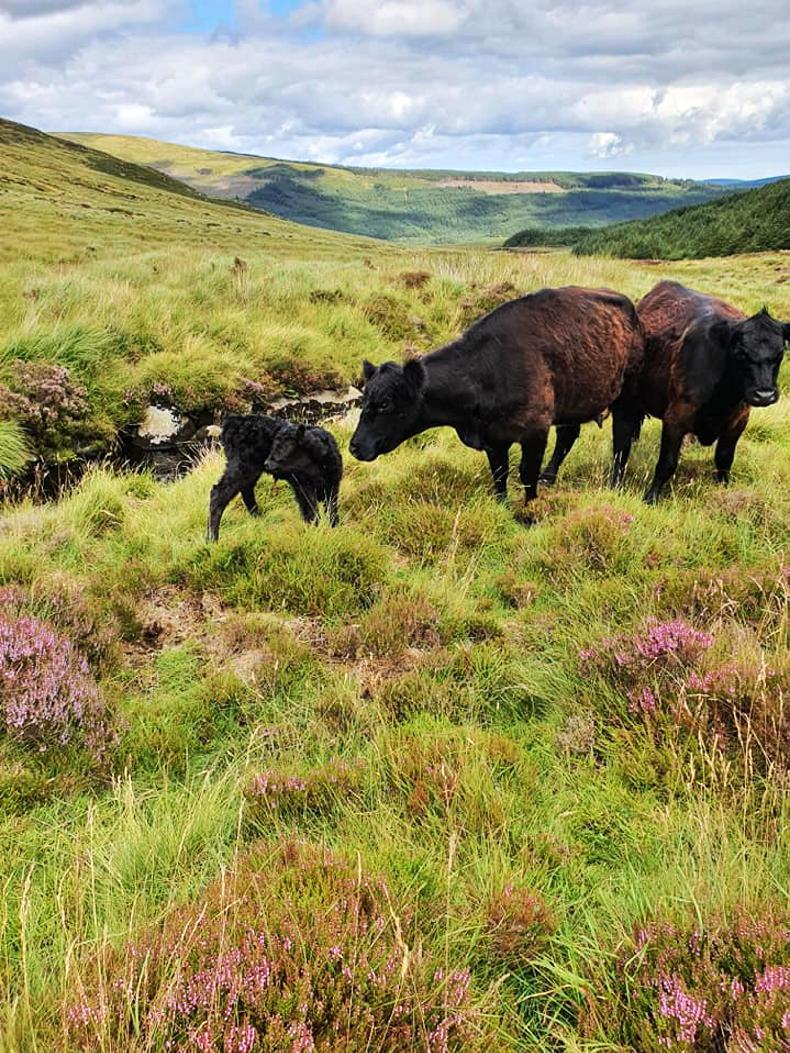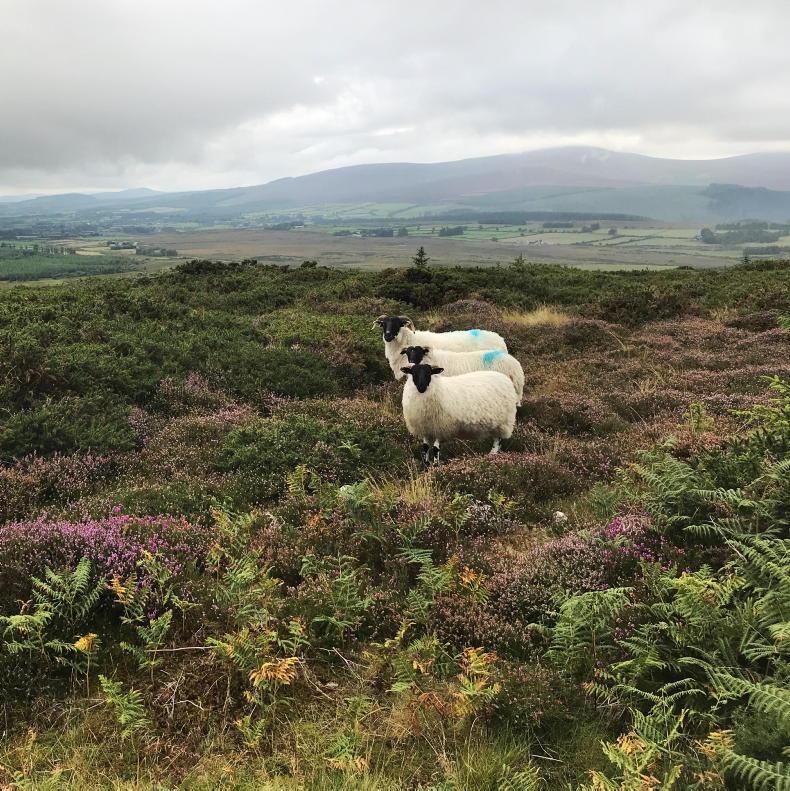Farmers are at the heart of the habitat improvements commenced through the Wicklow Uplands SUAS EIP, according to its ecologist Faith Wilson.
She said that there was “great dialogue” between farmers, the National Parks and Wildlife Service (NPWS) and ecologists during the five-year scheme, resulting in improved conditions for the flora and fauna of the uplands.
The Sustainable Uplands Agriculture-environment Scheme (SUAS) commenced in 2018 and involved hill farmers working to improve grazing management, controlled burning and tree planting.
They walked their commonages with ecologists, studied the plants there and began addressing the habitat degradation on the hills.
A number of farmers invested in traditional cattle breeds for conservation grazing, using GPS collars to keep them to hill areas where they were most required.
Others altered their sheep systems to keep flocks on the hill longer and avoided fitting into a more lowland approach.
The European Innovation Partnership (EIP) has paid farmers for these environmental measures and concluded at an event in Wicklow this week. All parties present described their “disappointment” that SUAS was ending and called for it to be continued.

Farmers have started running traditional cattle breeds on the hill to create a "balance" that works with more selective sheep grazing.
‘Going wrong for farmers’
Describing her assessment of the Wicklow uplands at the event, Wilson said: “What’s been going wrong ecologically has actually also been going wrong for farmers but it mightn’t have been realised.”
She highlighted excessive burning and poor grazing management as key issues that have contributed to a decline in plant biodiversity and cracked upland peat.
“You walk it and you look at what the plants are and you start saying we’re actually losing our grazing.
“We thought we were doing the right thing. We thought in burning the hill that this is how you manage a hill.”
The SUAS ecologist said mountain peat grows in depth by 1mm a year and warned that years of upland fires have led to it “haemorrhaging carbon”.
“Intense burning is not the way to go. We’re ending up in this vicious cycle of areas getting out of control and then being burnt into an inch of their life.
“The legacy of historic burning in the Wicklow uplands has been extremely damaging. The hills have been going wrong for a long time and it’s going to take a long time to get them right,” she said.

Farmers in the Wicklow uplands were encouraged to keep sheep on the hills longer, not just for the summer, in order to more evenly spread out grazing and vegetation recovery.
Beginning to see results
SUAS project lead and farmer Pat Dunne agreed with Wilson’s analogy.
Describing his disappointment that the scheme was ending, he said “things we did in the first year, we’re only beginning to see the results now”.
“It takes a long time. What you do in the uplands, there’s probably eight to 10 years before you see proper results for it.
“Five years is too short. As has happened in the past, we’ve seen almost every five years, there’s been a change in direction,” he said.
Head of Scotland’s Hill and Mountain Research Centre, professor Davy McCracken backed Dunne’s thinking but suggested that as long as there is a “vision” for the Wicklow uplands, successor schemes for farmers can “fit into” this.
ACRES
As SUAS ends, its farmers have been presented with the ACRES co-operation approach as somewhat of a replacement.
Opening this week’s event, Minister for Land Use and Biodiversity Pippa Hackett also noted that there will be a call for new EIP project proposals in 2023, under the next CAP strategic plan.
However, Wicklow IFA chair Tom Byrne said if another EIP application was successful, it would be at least 2026 before payments would recommence for the farmers.
SUAS project manager Declan Byrne said that he expects ACRES to “make mistakes” but suggested the CAP scheme will have to be “given time to build and to learn”.
“The only way to be successful is if the learnings we have made during SUAS are taken forward into the new schemes. That’s out of our hands.”
However, he too warned that politicians need to “put a vision in place” to decipher “what we want in our uplands overall” and called on them to fund such a plan.
Farmers are at the heart of the habitat improvements commenced through the Wicklow Uplands SUAS EIP, according to its ecologist Faith Wilson.
She said that there was “great dialogue” between farmers, the National Parks and Wildlife Service (NPWS) and ecologists during the five-year scheme, resulting in improved conditions for the flora and fauna of the uplands.
The Sustainable Uplands Agriculture-environment Scheme (SUAS) commenced in 2018 and involved hill farmers working to improve grazing management, controlled burning and tree planting.
They walked their commonages with ecologists, studied the plants there and began addressing the habitat degradation on the hills.
A number of farmers invested in traditional cattle breeds for conservation grazing, using GPS collars to keep them to hill areas where they were most required.
Others altered their sheep systems to keep flocks on the hill longer and avoided fitting into a more lowland approach.
The European Innovation Partnership (EIP) has paid farmers for these environmental measures and concluded at an event in Wicklow this week. All parties present described their “disappointment” that SUAS was ending and called for it to be continued.

Farmers have started running traditional cattle breeds on the hill to create a "balance" that works with more selective sheep grazing.
‘Going wrong for farmers’
Describing her assessment of the Wicklow uplands at the event, Wilson said: “What’s been going wrong ecologically has actually also been going wrong for farmers but it mightn’t have been realised.”
She highlighted excessive burning and poor grazing management as key issues that have contributed to a decline in plant biodiversity and cracked upland peat.
“You walk it and you look at what the plants are and you start saying we’re actually losing our grazing.
“We thought we were doing the right thing. We thought in burning the hill that this is how you manage a hill.”
The SUAS ecologist said mountain peat grows in depth by 1mm a year and warned that years of upland fires have led to it “haemorrhaging carbon”.
“Intense burning is not the way to go. We’re ending up in this vicious cycle of areas getting out of control and then being burnt into an inch of their life.
“The legacy of historic burning in the Wicklow uplands has been extremely damaging. The hills have been going wrong for a long time and it’s going to take a long time to get them right,” she said.

Farmers in the Wicklow uplands were encouraged to keep sheep on the hills longer, not just for the summer, in order to more evenly spread out grazing and vegetation recovery.
Beginning to see results
SUAS project lead and farmer Pat Dunne agreed with Wilson’s analogy.
Describing his disappointment that the scheme was ending, he said “things we did in the first year, we’re only beginning to see the results now”.
“It takes a long time. What you do in the uplands, there’s probably eight to 10 years before you see proper results for it.
“Five years is too short. As has happened in the past, we’ve seen almost every five years, there’s been a change in direction,” he said.
Head of Scotland’s Hill and Mountain Research Centre, professor Davy McCracken backed Dunne’s thinking but suggested that as long as there is a “vision” for the Wicklow uplands, successor schemes for farmers can “fit into” this.
ACRES
As SUAS ends, its farmers have been presented with the ACRES co-operation approach as somewhat of a replacement.
Opening this week’s event, Minister for Land Use and Biodiversity Pippa Hackett also noted that there will be a call for new EIP project proposals in 2023, under the next CAP strategic plan.
However, Wicklow IFA chair Tom Byrne said if another EIP application was successful, it would be at least 2026 before payments would recommence for the farmers.
SUAS project manager Declan Byrne said that he expects ACRES to “make mistakes” but suggested the CAP scheme will have to be “given time to build and to learn”.
“The only way to be successful is if the learnings we have made during SUAS are taken forward into the new schemes. That’s out of our hands.”
However, he too warned that politicians need to “put a vision in place” to decipher “what we want in our uplands overall” and called on them to fund such a plan.








 This is a subscriber-only article
This is a subscriber-only article










SHARING OPTIONS: